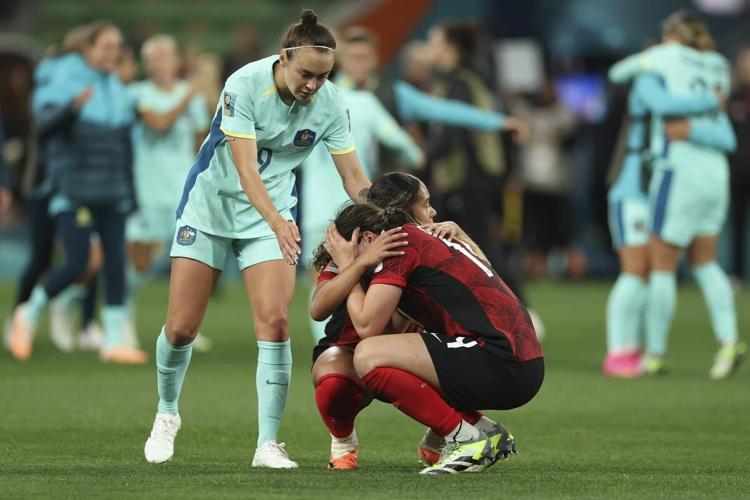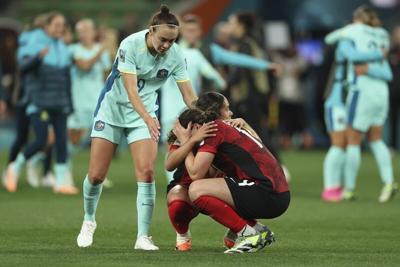What will we remember? What are the abiding images from Canada’s World Cup campaign Down Under.
With 62 minutes on the clock in Melbourne on Monday, one struck us as a fitting memory: seven or eight breathless Canadians, hands on hips and heads leaning in, trying to shake startled stares to focus their eyes on Bev Priestman’s iPad as the manager whispered instructions surely being lost in the Aussie racket. Just behind them, Mary Fowler lingered and smiled a relaxed smile.
The Australian striker had just made it 3-0 for the host nation against a Canada team that hadn’t turned up, not on this day or any of its three in the World Cup, a tournament over before it got going for a team which had spoken so confidently about winning it all. You assume Priestman was showing her players the Ireland-Nigeria game that was going on simultaneously up in Brisbane, because an Irish landslide was now Canada’s only hope of progress.
Relying on others. That, unfortunately, has become an all-too-familiar position for Priestman and her players: unforgivably let down, hampered and hobbled by their own federation for 18 months and more. Statistically, this wasn’t Canada’s worst ever Women’s World Cup performance. But in a real-world sense it surely was, the first reigning Olympic champions to be dumped out at the group stage. And, for all the injuries and bad breaks, for all Priestman’s stubborn tactical errors, so much of the wider and deeper blame lies at the feet of Canada Soccer.
A team that has had its budgets slashed, its training opportunities cut, has been forced on to the field under threat of being sued by its own federation, which made more appearances on Parliament Hill than on a Canadian field in the past year and which has been kept at the negotiating table during the tournament itself, didn’t live up to expectations. I mean, really, who could have foreseen such an outcome? Canada Soccer has been a shambles, still looks to be a shambles and now the one team that has consistently defied it all has also been left to look a shambles on the world stage.
Christine Sinclair deserved better. Sophie Schmidt deserved better. They all did. The only small solace perhaps was when pre-match cameras captured Canada Soccer president Charmaine Crooks perched beside Gianni Infantino. The game’s figurehead here having to sit beside the FIFA president as her country’s team was mortifyingly torn asunder, losing 4-0 when it could have been multiples of that, must have been cause for plenty of discomfort. There’ll be more to come.
Priestman was still shook when she stepped in front of the cameras afterward. She spoke about being taken aback at the result and briefly tried to turn attention to next summer’s Olympics and belief and such things, but this was a night for sitting with the moment, with the gravity of it all … and the shame of it all, too.

Canada coach Bev Priestman speaks to her players during a break in second half Group B soccer action against Australia at the FIFA Women’s World Cup in Melbourne, Australia on Monday.
THE CANADIAN PRESSOver before it began
After Canada’s second-half turnaround against the Irish in Perth, the premature praise from many corners centred on Priestman’s tactical switches at halftime. We had seen it another way: “In needing to make such wholesale changes to her team on the fly, Priestman has been correcting starting XIs which were wrong to begin with. With Australia next … mistakes will be punished quicker and more emphatically. Priestman may not be given the chance to correct in-game.”
Priestman had to get things right in Melbourne, but had the luxury of knowing the opposition, under all of the pressure, had to win minus Sam Kerr. Yet she set her team up to ease that pressure, to give the Aussies an instant foothold. They wouldn’t waste it. Sinclair was restored to the starting XI as a central striker, a move that felt like Priestman reaching for the safety blanket, but instead it became a straitjacket. The captain was immediately isolated and Canada was without a focal point.
The midfield was again an unholy mess: Quinn, Julia Grosso and Jessie Fleming all coming deep when Canada was in possession and getting in each other’s way. When Australia attacked, that familiar chasm between midfield and defence was there again. The only surprise was that it took the Matildas nine minutes to score.
They pulled first Jayde Riviere and then Kadeisha Buchanan out of position with ease. When the cross came in, a team that became Olympic champion through defensive solidity was again a sloppy, soupy mess. Hayley Raso had three touches undisturbed to take her time to fire Australia ahead. It would be an ugly slog from there.
Reversal of fortune
Canada was given a gift just before halftime against Ireland, the kind of moment of luck that can turn a tournament. As the defence listed again Monday, fortune was again on its side when referee Stéphanie Frappart harshly ruled out a Fowler goal on 34 minutes for offside.
Canada still fumbled it, giving up a woeful second goal just five minutes later when Kailen Sheridan, normally so assured, badly misjudged a corner for the second game in a row. Priestman tried to ring in the changes again, making four switches at halftime including bringing the curtain down on Sinclair’s World Cup career in the most underwhelming way imaginable.
But there was no fixing her side on this night. Before the hour, Australia again threatened and five Canadian defenders inexplicably stood still, leaving Fowler all alone to bundle in a third. Out came the iPad, but there was no Irish rescue mission. The closing act of Canada’s campaign would be Fleming, its best creative talent, conceding an injury-time penalty to let the Aussies round off a rout. Fitting.
Plotting a way forward
Much as Priestman’s attempts to immediately move the narrative on to next summer’s Olympics felt off, the manager is right that there’s only so long to wallow. With so many issues at the World Cup — Buchanan’s defensive frailty was truly stark — it’s up front where Priestman, assuming she stays at the helm, has to now earn her corn.
Canada, the seventh-ranked team in the world, scored just a single goal of its own across more than five hours of soccer in Australia. Being so toothless and tedious in attack is not remotely sustainable. Sinclair was cut adrift Monday, Jordyn Huitema and Adriana Leon both left to forage blindly out wide and Fleming anonymous in a creative sense. It was grim and yet fitting with the two previous games.
An Olympic qualifier against Jamaica in ÎÚŃ»´«Ă˝ in September will roll around quickly. It’s past time for Priestman to shake off some of her stubborn pragmatism and unlock Canada’s attack. Much as her employers hamper her efforts at so many turns, the manager is paid to do a job and, after a night as dark as this, really needs to deliver now.
























To join the conversation set a first and last name in your user profile.
Sign in or register for free to join the Conversation